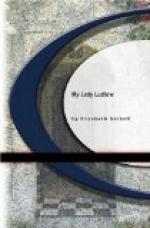“My dear Mr. Gray,” said my lady (the day before I could never have believed she could have called him My dear), “you must take the advice of an old woman about yourself. You are not fit to do anything just now but attend to your own health: rest, and see a doctor (but, indeed, I will take care of that), and when you are pretty strong again, you will find that you have been magnifying evils to yourself.”
“But, my lady, I cannot rest. The evils do exist, and the burden of their continuance lies on my shoulders. I have no place to gather the children together in, that I may teach them the things necessary to salvation. The rooms in my own house are too small; but I have tried them. I have money of my own; and, as your ladyship knows, I tried to get a piece of leasehold property, on which to build a school-house at my own expense. Your ladyship’s lawyer comes forward, at your instructions, to enforce some old feudal right, by which no building is allowed on leasehold property without the sanction of the lady of the manor. It may be all very true; but it was a cruel thing to do,—that is, if your ladyship had known (which I am sure you do not) the real moral and spiritual state of my poor parishioners. And now I come to you to know what I am to do. Rest! I cannot rest, while children whom I could possibly save are being left in their ignorance, their blasphemy, their uncleanness, their cruelty. It is known through the village that your ladyship disapproves of my efforts, and opposes all my plans. If you think them wrong, foolish, ill-digested (I have been a student, living in a college, and eschewing all society but that of pious men, until now: I may not judge for the best, in my ignorance of this sinful human nature), tell me of better plans and wiser projects for accomplishing my end; but do not bid me rest, with Satan compassing me round, and stealing souls away.”
“Mr. Gray,” said my lady, “there may be some truth in what you have said. I do not deny it, though I think, in your present state of indisposition and excitement, you exaggerate it much. I believe—nay, the experience of a pretty long life has convinced me—that education is a bad thing, if given indiscriminately. It unfits the lower orders for their duties, the duties to which they are called by God; of submission to those placed in authority over them; of contentment with that state of life to which it has pleased God to call them, and of ordering themselves lowly and reverently to all their betters. I have made this conviction of mine tolerably evident to you; and I have expressed distinctly my disapprobation of some of your ideas. You may imagine, then, that I was not well pleased when I found that you had taken a rood or more of Farmer Hale’s land, and were laying the foundations of a school-house. You had done this without asking for my permission, which, as Farmer Hale’s liege lady, ought to have been obtained legally, as well as asked for out




